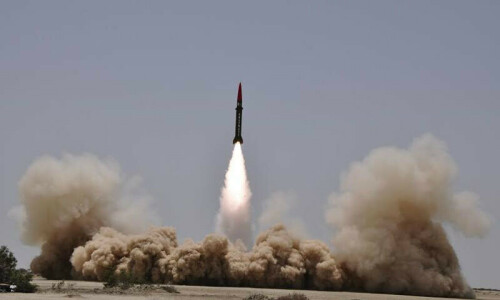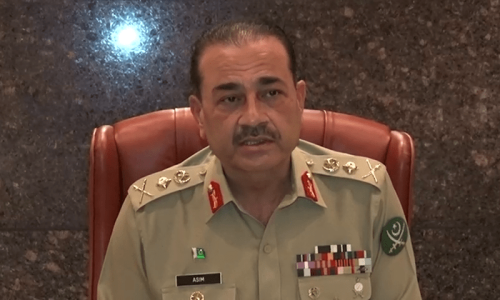THE security situation in Pakistan continues to be of concern. And the decision to repatriate illegal migrants has done little to stem the tide. That the latter is a result of the increasing unease over the former is a message the caretaker governments have been at pains to disseminate.
The decision to zero in on the ‘migrants’ came shortly after the bloodbath in Mastung in the last week of September, in which nearly 60 people lost their lives. Within days of the attack in Balochistan, APP, the state-owned news agency, reported that “The caretaker government has decided to evict 11 lacs foreigners living illegally in Pakistan because of their involvement in funding, facilitating terrorists and other illegal activities.
“In the first phase, illegal residents, in the second phase, those with Afghan citizenship and in the third phase, those with proof of residence cards will be expelled. ‘Illegally [sic] resident foreigners pose a serious threat to the security of Pakistan’, said a source privy to the development.”
There is little space to carry out large-scale military operations as in the past.
A day later, the interior minister briefed the media after the apex committee meeting. Announcing the Nov 1 deadline he said, “The most important thing that was decided was that the welfare and security of a Pakistani are most important for us over any country or its policy.” Once again, he seemed to link the decision to the security situation.
The caretaker prime minister also expressed similar views.
Such statements, which were repeated more than once, were sufficient to link the decision to the deteriorating security situation in Pakistan. And as the focus shifted to the administrative preparations and movement of the migrants, it appeared that the number of attacks also came down. But this was not a permanent shift. By November, it appeared that the attacks were increasing again.
Unfortunately, the caretaker government’s constant efforts to link the deportation/return of the migrants with the security situation means that the policy is now being seen as ineffective, coupled as it is with portrayal of the migration as having caused human suffering. This perception is going to be hard to change, especially as the ministers seem unaware of the consequences of their statements.
However, outside of the caretaker set-ups, the matter has set off a larger debate on Islamabad’s policy towards Afghanistan and the militancy within, especially by the TTP.
The tense relationship with Afghanistan has now laid to rest all earlier assertions of a better regional environment with the change of regime in Kabul. And it is also leading to serious questions about the larger policy towards the western neighbour. At the same time, there is a growing debate about the challenge of militancy and its growing complications (compared to what Pakistan dealt with the last time).
For instance, there are increasing reports of the TTP’s expansion into Balochistan and what this means for the insurgency there, especially as some reports suggest there may even be cooperation between the former and Baloch separatist organisations.
Similarly, the TTP has changed its tactics and is now trying to reach out to the people, instead of solely relying on violence. Its use of social media, for example, and outreach on interests of public importance will need a response, which seems to be missing at the moment. The strategy of simply constraining coverage on mainstream media may not prove enough.
On the other hand, what is even more serious is the absence of a clear strategy on the part of the state. After all, there is little space — fiscal or otherwise — to carry out large-scale military operations as in the past.
And frankly, there is little clarity on how effective they may prove this time around, especially as ordinary people are wary of military operations because of what they entail for residents. What are the options in this case and will they prove effective, especially as civilian law-enforcement personnel continue to be short on resources?
However, these questions remain unanswered (and even unasked) because the state has not managed to be transparent. The decision to negotiate with the Taliban during the PTI tenure was kept under wraps; it became public knowledge only due to what appeared to be a slip of the tongue by the then prime minister Imran Khan during an interview.
Even then, little effort was made to create any consensus in society. Little effort was made to explain the reasoning behind this decision. That this decision was abandoned later for a zero-tolerance policy was also made in an opaque manner. Once again, there was little effort to communicate or create any consensus.
It is worth considering whether this top-down state of affairs is a reason for the kind of confusion that surrounds the larger issue.
In KP and beyond, rumours abound about the number of casualties and how the real figure is being hidden from the people. Or that elements within are supporting the militants and have made possible their return; such rumours are not limited to the ordinary people but also officialdom.
In so many ways, the state of affairs is similar to what existed in 2007 and later. But at that time, not only were those in charge aware of it, they also took steps to address it before implementing the decision to take on the Taliban.
Chances are the present will prove no different from the past. Sooner (and hopefully not later) Pakistan has to come together to address this challenge. This will require building a consensus as we did in the past.
A consensus which includes a debate and public buy-in, which will be impossible without getting the political leadership within parliament and outside on board. And it will also require brainstorming on the evolution of the threat and how to address it.
But before any of these steps can be taken, we will need to acknowledge that security issues cannot be viewed as simply administrative matters, where state force will prove sufficient.
The political context in which they arise has to be recognised. Take Balochistan, for example; a political process has to be initiated there. Without that, little will be achieved just through the use of force.
The writer is a journalist.
Published in Dawn, December 5th, 2023















































Dear visitor, the comments section is undergoing an overhaul and will return soon.